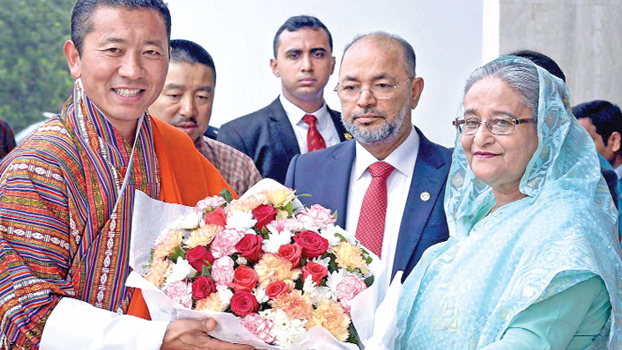Bangladesh-Bhutan, a friendship to celebrate

The visit of Bhutanese Prime Minister Lotay Tshering to Bangladesh is like his return to the second home. He spent 11 years in Bangladesh to study MBBS at Mymensingh Medical College and later for postgraduate training in Dhaka. So he knows much about Bangladesh.
Again he came back to Dhaka as a Prime Minister in 2019 and attended the Bangla New Year – Pahela Boishak – celebration on April 14 when he termed the country his “second home”.
On Tuesday, he came to a state visit at a historic moment of Bangladesh. He is a guest of honour in the twin celebrations of the birth centenary of Father of the Nation Bangabandhu Sheikh Mujibur Rahman and the golden jubilee of independence of Bangladesh.
In Bhutan, Bangladesh finds a special friend. It is the first country that recognised Bangladesh as a sovereign and an independent country in 1971.
It is also the first country with which Bangladesh has signed the first ever Preferential Trade Agreement (PTA), consolidating the relations. That signing last year also took place at a historic moment of December 6, exactly when Bhutan recognised Bangladesh. That good news for Bangladesh came at a difficult time as the whole world was reeling from the pandemic.
But for Bangladesh and Bhutan, it was a celebration as both the countries share a unique and time tested bilateral relationship.
The memory of giving recognition to Bangladesh is still vivid to Prime Minister Sheikh Hasina, who is the daughter of Bangabandhu. It evokes powerful emotions to the hearts of Bangladeshis.
“That day you know during our liberation war Pakistani Army arrested my father and took him to Pakistan. But in Bangladesh Pakistani army arrested my mother, my younger sister Rehana, my younger brother Rasel, Jamal and myself.
That very day Jamal, Kamal escaped from captivity and joined freedom fighting. But my mother, my younger sister Rehana, Rasel, myself and my three months old son Sajeeb Wazed Joy, we were in captivity. The day we heard that Bhutan recognized Bangladesh. It was something (a feeling that) I cannot explain,” the prime minister said last year during the PTA signing ceremony.
“….Bhutan has a very special place in our heart. I can tell you that much,” she had said.
Bhutan, a Buddhist kingdom on the Himalayas eastern edge, is bordered by China to the north and India to the south. Bhutan’s ‘Gross National Happiness’ concept instead of GDP calculation for economic growth has won the admiration of the world.
Both Bangladesh and Bhutan have historical linkages from common cultural values, to traditions, and geo-political realities.
There are many areas in which both countries cooperate with each other. Those include trade, tourism, hydro-power, climate change impacts, health, bio-diversity, agro-processing, agriculture, ICT, education, and water resource management.
There are many other ways to cooperate.
Prime Minister Sheikh Hasina is open to offer anything to Bhutan.
She said Bhutan can use the water ways. “Our water ways link has already started. We're developing our Chilmari port. Chilmari port, Narayanganj and Pangaon are open to you. Not only that, our three ports Chittagong, Mongla, Payra, any place Bhutan wants.. you can use it, I am offering you to do that.”
The airport at northern Sayedpur is also open for Bhutan. “If you wish you can use that airport too,” said the prime minister. “On the rail Chilahati we're opening so that also gives another opportunity.”
“It is time that we make our extraordinary relations even more meaningful for mutual benefits and for the overall development and well-being of our citizens,” she had said while signing the PTA in that spirit.
Bangladesh is the 2nd largest trading partner of Bhutan after India. But the volume of trade is very low despite geographical proximity and huge potential. Both the countries are enjoying excellent bilateral trade relations and both the countries are members of SAFTA, BIMSTEC, and BBIN, according to the Bangladesh embassy in Bhutan.
As Bangladesh completes 50 years of independence, so the bonhomie with Bhutan, it is time to explore new areas of cooperation for sustained development and happiness of citizens of the region for the next 50 years.





